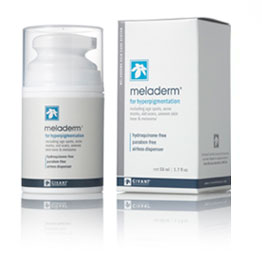Is Skin Lightening Cream Dangerous?
By Annabelle RoylanceYou may be wondering if skin lightening is dangerous. You’re smart to wonder. First the bad news, then the good.
In the past synthetic hydroquinone was a standard ingredient in skin lightening products: whitening cream, skin lightening cream, lightening cream to treat age spots. Hydroquinone has already been banned in Japan, the European Union, and Australia. And according to an article on MedicineNet.com, the FDA will follow suit.
The FDA connects their ban request to rodent studies which showed “some evidence” that hydroquinone may act as a carcinogen (cancer-causing) chemical. And there are other potential side effects from Hydroquinone including ochronosis – a medical problem causing the skin becomes thick and dark. Ochronosis may also cause yellow and gray-brown splotches in black men and women. Also alarming, some studies report abnormal adrenal gland function and high mercury levels in people with a history of using cosmetic treatments containing hydroquinone. Excessive mercury may result in kidney and neurological damage.
The good news is that many manufacturers now produce skin lightening creams using natural alternatives that mimic hydroquinone’s effective properties. Kojic acid and licorice work well along with more sophisticated ingredients like Alpha-Arbutin. Combines, these ingredients often generate better results than hydroquinone without the risks.
One of the best skin lightening products on the market is Meladerm. With almost 12,000 likes on Facebook and thousands of positive Meladerm reviews, it’s obvious that it works.
And even better? Meladerm never uses hydriquinone in their skin lightening products.
In the past synthetic hydroquinone was a standard ingredient in skin lightening products: whitening cream, skin lightening cream, lightening cream to treat age spots. Hydroquinone has already been banned in Japan, the European Union, and Australia. And according to an article on MedicineNet.com, the FDA will follow suit.
“…the U.S. Food and Drug Administration (FDA) proposed a ban on over-the-counter sales of cosmetic products containing hydroquinone, a skin-bleaching (lightening) ingredient. According to the FDA, approximately 65 companies sell over 200 different types of skin-lightening products containing hydroquinone in the U.S. Currently, products that contain up to 2 percent hydroquinone may be sold in the U.S. without a prescription, and prescription skin-lightening products may contain up to 4 percent hydroquinone.”
The FDA connects their ban request to rodent studies which showed “some evidence” that hydroquinone may act as a carcinogen (cancer-causing) chemical. And there are other potential side effects from Hydroquinone including ochronosis – a medical problem causing the skin becomes thick and dark. Ochronosis may also cause yellow and gray-brown splotches in black men and women. Also alarming, some studies report abnormal adrenal gland function and high mercury levels in people with a history of using cosmetic treatments containing hydroquinone. Excessive mercury may result in kidney and neurological damage.
The good news is that many manufacturers now produce skin lightening creams using natural alternatives that mimic hydroquinone’s effective properties. Kojic acid and licorice work well along with more sophisticated ingredients like Alpha-Arbutin. Combines, these ingredients often generate better results than hydroquinone without the risks.
One of the best skin lightening products on the market is Meladerm. With almost 12,000 likes on Facebook and thousands of positive Meladerm reviews, it’s obvious that it works.
And even better? Meladerm never uses hydriquinone in their skin lightening products.

Annabelle Roylance is the editor of Best SkinCare Products.
Email this author





